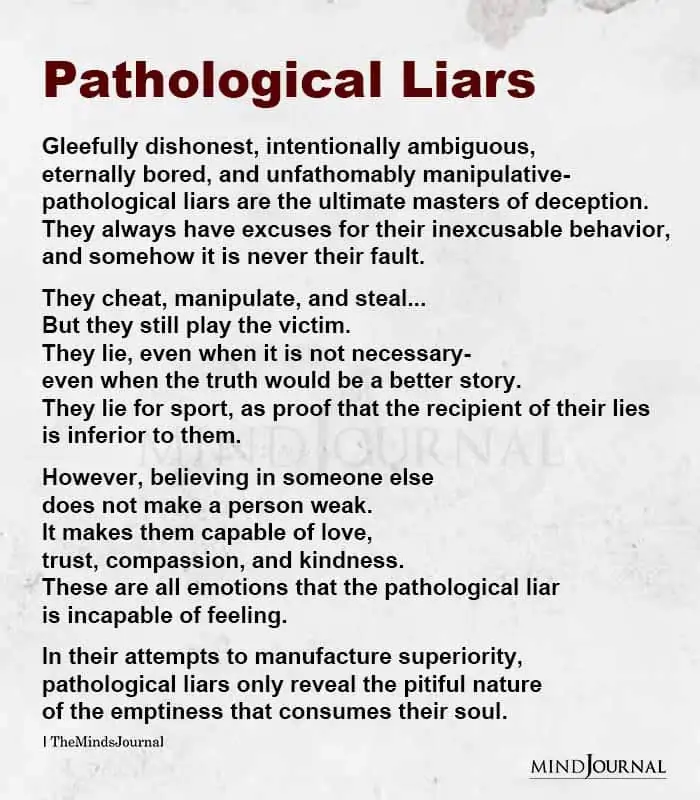Ever met someone who constantly distorts the truth, weaves elaborate tales or downright lies all the time? Dealing with a compulsive liar can be perplexing and frustrating. This is why it is crucial that you learn about compulsive lying treatment and how to deal with compulsive lying in a healthy way.
Welcome to the world of compulsive liars and compulsive lying, where every story seems too good to be true. These individuals spin elaborate tales effortlessly, blurring the lines between fact and fiction.
Let’s unravel the psychology behind this intriguing phenomenon by exploring the mysteries surrounding compulsive lying, exploring compulsive liar symptoms, what causes compulsive lying, and most importantly, the available compulsive lying treatment options.
What is Compulsive Lying?
At its core, compulsive lying is a behavior characterized by the consistent and often uncontrollable urge to lie, fabricate or exaggerate information, even when there is no apparent reason to do so.

According to researchers, such pathological or compulsive lying can “be extensive and very complicated, manifesting over a period of years or even a lifetime.” Further research has revealed that persistent and compulsive lying can lead to serious challenges and difficulties for compulsive liars and their victims.
It was also found that such behavior is often driven by multiple factors. “Some may lie to improve their own self esteem or to make another person feel better, whereas some people lie to seem more impressive and likeable,” explain the researchers.
Related: Habitual Liars And Their Agendas
Compulsive liars tend to spin intricate webs of deceit, blurring the line between reality and fiction. For them, lying becomes an ingrained habit, a reflexive response to various situations. However, compulsive lying treatment and certain self-help strategies can help overcome such behavior.
Examples of Compulsive Lying
Picture a colleague who always has an excuse for being late, whether it’s a traffic jam or a sudden illness, yet their stories never quite add up.
Or a classmate who embellishes every detail of their weekend exploits, intimidating you with tales of exotic trips and celebrity encounters, but you later find out they’ve never left their hometown.
How about this? Imagine a friend who habitually exaggerates their accomplishments and experiences. They constantly recount elaborate tales of academic accolades, grand achievements, glamorous parties, and exciting adventures, painting a picture of a life filled with glamor and success.
Yet, upon closer inspection, their claims unravel, revealing inconsistencies and embellishments that leave you questioning their authenticity.
Compulsive lying can not only hamper the liar’s reputation and credibility, it can also strain relationships and erode trust. It perpetuates a cycle of deceit and manipulation, isolating individuals from genuine connections.
Moreover, it undermines one’s sense of self-worth, fostering insecurity and guilt. Untreated, it can lead to social, psychological, and even legal consequences, impacting overall well-being. This is why it is absolutely necessary that you learn about compulsive lying treatment, if you are dealing with such an individual.

Compulsive Liar Symptoms You Can’t Afford to Miss
Identifying the signs of compulsive lying can help shed light on this complex behavioral pattern. Some common compulsive liar symptoms include:
1. Consistent Fabrication
Compulsive liars frequently concoct stories and narratives that are far from the truth. These tales may range from minor exaggerations to grandiose fantasies.
2. Lack of Remorse
Unlike occasional liars who feel guilt or remorse after lying, compulsive liars often exhibit a lack of remorse or guilt associated with their deceitful behavior.
3. Pattern of Deception
A key symptom of compulsive lying is the repetition of deceptive behavior. It becomes a recurring pattern in their interactions with others.
Related: The Science Of Lying: 9 Things You Should Know About Liars
4. Unnecessary Lies
Compulsive liars may lie about mundane or inconsequential matters, even when there is no apparent benefit or motive behind their falsehoods. This is the most basic compulsive liar symptoms.
5. Difficulty Maintaining Consistency
Due to the sheer volume of lies they tell, compulsive liars often struggle to maintain a consistent narrative, leading to contradictions and inconsistencies in their stories.
What Causes Compulsive Lying?
Understanding the underlying causes of compulsive lying is crucial to developing effective treatment strategies. While no single cause can be pinpointed, several factors may contribute to this behavior:
1. Psychological Factors
Compulsive lying is often associated with underlying psychological conditions such as –
- Borderline personality disorder
- Narcissistic personality disorder
- Impulse control disorder
These conditions can fuel the need for attention, validation, or a desire to manipulate others. This is why compulsive lying treatment is so important.
2. Past Trauma or Abuse
Individuals who have experienced traumatic events or abusive environments may resort to compulsive lying as a coping mechanism, creating alternate realities to escape the pain or seek validation.
3. Low Self-Esteem
A lack of self-confidence or low self-esteem can drive individuals to fabricate stories to gain acceptance or admiration from others, compensating for their perceived inadequacies. This is what causes compulsive lying.
4. Habituation
Engaging in lying over an extended period can reinforce the behavior, making it increasingly difficult for individuals to break the cycle.

Compulsive Lying Treatment
Fortunately, there are various treatment approaches available to help individuals overcome compulsive lying. Here are some effective strategies:
1. Psychotherapy
Individual therapy, such as cognitive-behavioral therapy (CBT), can be immensely valuable in treating compulsive lying. Therapists help individuals identify underlying triggers, develop coping mechanisms, and challenge negative thought patterns associated with lying.
2. Group Therapy
Participating in group therapy sessions alongside others who struggle with compulsive lying can provide a supportive and empathetic environment. Sharing experiences and learning from one another can foster personal growth and encourage accountability.
Related: How To Spot A Liar? 7 Signs Someone Is Lying To You
3. Addressing Underlying Conditions
Once you know what causes compulsive lying, it is important that you seek medical support to address it. If compulsive lying coexists with other psychological disorders, treating those conditions concurrently can be pivotal. By focusing on the root causes, therapists can help individuals develop healthier coping mechanisms and self-perception.
4. Developing Trust and Honesty
Learning to build trust and embrace honesty is a fundamental aspect of compulsive lying treatment. Therapists work with individuals to cultivate open and authentic communication, fostering healthier relationships.
5. Patience and Self-Reflection
Overcoming compulsive lying is a journey that requires time and self-reflection. Individuals must be patient with themselves, acknowledge their progress, and stay committed to personal growth.

How to Deal With Compulsive Lying
Dealing with a compulsive liar can be challenging and frustrating. However, by adopting a thoughtful and compassionate approach, you can navigate the situation more effectively. Here are some strategies on how to deal with compulsive lying:
1. Recognize the Pattern
First and foremost, it’s essential to recognize that you are dealing with a compulsive liar. Understand that their lies are not personal attacks on you but rather a manifestation of their own struggles and habits.
By recognizing the pattern, you can detach yourself emotionally and approach the situation with greater objectivity.
2. Avoid Confrontation
Confronting a compulsive liar about their lies may not yield the desired outcome. They might become defensive or continue lying to protect their false narratives. Instead, focus on your own emotional well-being and determine how much you are willing to invest in the relationship.
3. Set Boundaries
Apart from compulsive lying treatment approaches, this is one of the most effective coping strategies. Establishing clear boundaries is crucial when dealing with a compulsive liar. Determine what behavior you are willing to tolerate and communicate your expectations calmly and assertively.
By setting boundaries, you protect yourself from being constantly manipulated or hurt by their lies.
4. Practice Empathy
Compulsive lying is often rooted in deeper psychological issues. Try to empathize with the person and understand that their lying may stem from a place of pain, insecurity, or past trauma.
While this doesn’t excuse their behavior, it can help you approach the situation with compassion.
5. Focus on Trustworthy Individuals
Surround yourself with trustworthy individuals who value honesty. By seeking out genuine and reliable relationships, you create a supportive network that can counterbalance the negative impact of dealing with a compulsive liar.
6. Verify Information
When interacting with a compulsive liar, it’s wise to fact-check information independently whenever possible. By verifying the accuracy of their claims, you can protect yourself from being misled or manipulated.
Rely on credible sources and seek multiple perspectives to gain a balanced understanding of the truth.
7. Encourage Professional Help
If compulsive lying becomes pervasive and negatively affects the individual’s personal or professional life, gently encourage them to seek professional help. A therapist or counselor can provide valuable guidance and support in addressing the underlying issues contributing to the compulsive lying behavior.
8. Maintain Self-Care
Dealing with a compulsive liar can be emotionally draining. It’s crucial to prioritize self-care to maintain your own well-being.
Engage in activities that bring you joy and relaxation, seek support from friends and family, and consider therapy for yourself if needed. This is one of the best tips on how to deal with compulsive lying.
Related: 13 Ways The Liars, Gaslighters, And Cheats Show You Who They Are
9. Consider Distance
In some cases, it may be necessary to distance yourself from a compulsive liar, especially if their behavior consistently undermines your well-being and trust. While it can be challenging, prioritizing your own mental and emotional health is essential.
Remember, you cannot change or control someone else’s behavior, but you can control how you respond to it. By implementing these strategies, you can navigate the complexities of dealing with a compulsive liar while safeguarding your own well-being.

Takeaway
Compulsive lying can be a complex and emotionally challenging behavior to address. By understanding the nature of compulsive lying, recognizing its symptoms, and exploring the underlying causes, we can pave the way for effective compulsive lying treatment.
Through therapy, self-reflection, and the cultivation of trust and honesty, individuals struggling with compulsive lying can embark on a path towards healing and authenticity. Remember, change is possible, and the journey to truthful living begins with self-awareness and a willingness to seek help.
So, let us embrace the power of truth and embark on a new chapter of our lives, unburdened by the weight of deceit.
Frequently Asked Questions (FAQs):
What is the root cause of compulsive lying?
Compulsive lying may stem from underlying issues such as low self-esteem, insecurity, trauma, or a desire for attention and validation.
What personality disorder is associated with compulsive lying?
Narcissistic personality disorder is often associated with compulsive lying due to a need for admiration and manipulation of others.
How do you treat compulsive lying?
Treatment for compulsive lying may involve therapy, such as cognitive behavioral therapy, to address underlying issues and develop healthier coping mechanisms.









Leave a Reply
You must be logged in to post a comment.